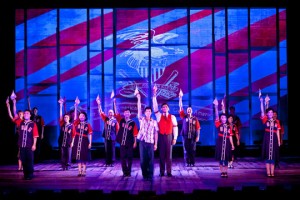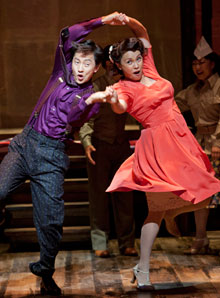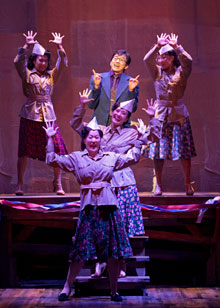
Imagine you were told by the country in which you were born and raised that you had only a few days to sell your home and all your possessions, minus of what you could carry with you. Imagine that you were then transported hundreds of miles away and forced to live in cramped barracks where you would swelter during the summer and freeze during the winter, month after month, year after year. Imagine what kind of country that would be and how you would feel about the land you had believed with all your heart was your own.
To those Americans who take comfort in the certainty that “It couldn’t happen here,” an extraordinary World Premiere musical called Allegiance reveals that it not only could, it did happen here, and a mere seventy years ago when almost 70,000 American citizens and another 40,000 who called America home were imprisoned in internment camps for most of World War II simply because of their race.
A truly dark chapter in our country’s history, but one from which composer-lyricist Jay Kuo and book writers Marc Acito, Kuo, and Lorenzo Thione have created a musical that educates, moves, and entertains, particularly as performed by a stellar cast under the inspired direction of Stafford Arima at San Diego’s Old Globe Theatre.
 Scenes featuring TV icon George Takei in the role of octogenarian Sam Kimura bookend Allegiance, which spends most of its time flashing back to a much younger Sammy (Telly Leung), born and raised on his family’s artichoke farm in rural Sonoma, California, an All-American high school hero on his way to becoming, who knows, maybe even President of the United States?
Scenes featuring TV icon George Takei in the role of octogenarian Sam Kimura bookend Allegiance, which spends most of its time flashing back to a much younger Sammy (Telly Leung), born and raised on his family’s artichoke farm in rural Sonoma, California, an All-American high school hero on his way to becoming, who knows, maybe even President of the United States?
The Japanese bombing of Pearl Harbor bursts Sammy’s bubble, as he and his family are given only days to sell everything they own—at ten cents to the dollar—before being sent off to the Heart Mountain Internment Camp in far-off Wyoming.
 Traveling with Sammy to the heart of nowhere are his elderly grandfather Ojii-San (Takei again), his Japanese-born father Tetsuo (Paul Nakauchi), and his elder sister Kei (Lea Salonga), who learn upon their arrival that not only will they be under the constant watch of armed guards, all four will be sharing a cramped barracks room without even a bathroom to call their own.
Traveling with Sammy to the heart of nowhere are his elderly grandfather Ojii-San (Takei again), his Japanese-born father Tetsuo (Paul Nakauchi), and his elder sister Kei (Lea Salonga), who learn upon their arrival that not only will they be under the constant watch of armed guards, all four will be sharing a cramped barracks room without even a bathroom to call their own.
 In fact, about the only friendly non-Asian face Sammy sees at Heart Mountain is that of volunteer nurse Hannah Campbell (Allie Trimm), a teenage Quaker who offers Sammy not merely friendship but the promise of perhaps even more. As for Kei, romantic bells begin to ring for her as well once she has laid eyes on fellow internee Frankie Suzuki (Michael K. Lee).
In fact, about the only friendly non-Asian face Sammy sees at Heart Mountain is that of volunteer nurse Hannah Campbell (Allie Trimm), a teenage Quaker who offers Sammy not merely friendship but the promise of perhaps even more. As for Kei, romantic bells begin to ring for her as well once she has laid eyes on fellow internee Frankie Suzuki (Michael K. Lee).
 Completing the cast of major characters is controversial real-life figure Mike Masaoka (Paolo Montalban), Field Executive of the Japanese American Citizens League, an organization whose decision to cooperate with the government’s internment plans sparks the conflict which will lead to Sammy and Kei’s six-decade estrangement, which we learn of in the musical’s opening scene.
Completing the cast of major characters is controversial real-life figure Mike Masaoka (Paolo Montalban), Field Executive of the Japanese American Citizens League, an organization whose decision to cooperate with the government’s internment plans sparks the conflict which will lead to Sammy and Kei’s six-decade estrangement, which we learn of in the musical’s opening scene.
At its most serious, Allegiance asks its audience to weigh two very different responses to Masaoka’s pleas for cooperation with the U.S. government, which soon include urging interned Japanese-Americans to volunteer for combat duty in Europe as members of the all-Nisei 442nd Regimental Combat Team. Sammy chooses enlistment as a way of proving his patriotism. Frankie refuses to fight until his family is freed from their forced internment.
 If all this seems hardly food for a musical, shows like The Scottsboro Boys and Parade (both of which had Scenie-winning San Diego productions this past year) have proven the contrary, as does Allegiance with its hummable score, production numbers featuring Andrew Palermo’s show-stopping choreography, and sensational work being done by some of America’s best known Asian-American performers.
If all this seems hardly food for a musical, shows like The Scottsboro Boys and Parade (both of which had Scenie-winning San Diego productions this past year) have proven the contrary, as does Allegiance with its hummable score, production numbers featuring Andrew Palermo’s show-stopping choreography, and sensational work being done by some of America’s best known Asian-American performers.
Kuo’s songs run a gamut of musical styles, from the traditionally Japanese “Shizu No Ko Ya” and “Ishi Kara Ishi” to 1940s boogie woogie in “Paradise” to Broadway pizzazz in “Better Americans” to the more generic though nonetheless powerful anthem “Higher.”
Takei, who has segued from Star Trek legend to being one of our country’s preeminent Japanese-American/LGBT community advocates, gives a pair of memorable performances, informed by his own childhood experiences behind barbed wire in forced internment.
As for young Sammy Kimura and Frankie Suzuki, they don’t come any more talented and charismatic than Broadway’s Leung and the Scenie-winning Lee. Montalban shines too despite having to play the villain of the piece, adding up to three quintessential triple-threats amply deserving of mainstream stardom.
 Then there is radiant Filipina superstar (and Broadway’s original Miss Saigon) Salonga, who not only can still play 20something Kei with ease, but struts some powerhouse dramatic chops even as she shows off her justly famed pipes in the show-stopping “Higher.”
Then there is radiant Filipina superstar (and Broadway’s original Miss Saigon) Salonga, who not only can still play 20something Kei with ease, but struts some powerhouse dramatic chops even as she shows off her justly famed pipes in the show-stopping “Higher.”
Nakauchi brings power, dignity, and authentic Japanese language skills to the role of Sammy’s father Tatsuo. As for Trimm, the soon-to-be Stanford undergrad does charming, winning work as the Allegiance’s sole sympathetic Caucasian-American character.
 A crème-de-la-crème ensemble of mostly New York-based Asian-American triple-threats dazzle in multiple-role tracks. They are Katie Boren, Jon Jon Briones, Karl Josef Co, Marc de la Cruz, MaryAnn Hu, Ann Sanders, Kay Trinidad, and Scott Watanabe. A quartet of San Diego’s best performers (fight captain Geno Carr, Brandon Joel Maier, Kürt Norby, and dance captain Jill Townsend) do fine work in assorted, mostly villainous cameos. Swings Jennifer Hubilla and Conrad Ricamora are poised to step into ensemble and leading roles when needed.
A crème-de-la-crème ensemble of mostly New York-based Asian-American triple-threats dazzle in multiple-role tracks. They are Katie Boren, Jon Jon Briones, Karl Josef Co, Marc de la Cruz, MaryAnn Hu, Ann Sanders, Kay Trinidad, and Scott Watanabe. A quartet of San Diego’s best performers (fight captain Geno Carr, Brandon Joel Maier, Kürt Norby, and dance captain Jill Townsend) do fine work in assorted, mostly villainous cameos. Swings Jennifer Hubilla and Conrad Ricamora are poised to step into ensemble and leading roles when needed.
Multitalented Lynne Shankel deserves kudos for her musical supervision, arrangements and orchestrations as does music director Laura Berquist, who also conducts the production’s Broadway-caliber pit orchestra.
 Scenic designer Donyale Werle and projection designer Darrel Maloney share credit for Allegiance’s striking look, taking us from rural Salinas to internment camp barracks to the battlefields of Europe, with scene-setting images projected on Japanese-style sliding paper screens. Alejo Vietti’s stunning costumes, Howard Binkley’s vivid lighting, and Jonathan Dean’s crisp, clear sound design complete Allegiance’s all-around first-rate design package. Angee Nero is stage manager.
Scenic designer Donyale Werle and projection designer Darrel Maloney share credit for Allegiance’s striking look, taking us from rural Salinas to internment camp barracks to the battlefields of Europe, with scene-setting images projected on Japanese-style sliding paper screens. Alejo Vietti’s stunning costumes, Howard Binkley’s vivid lighting, and Jonathan Dean’s crisp, clear sound design complete Allegiance’s all-around first-rate design package. Angee Nero is stage manager.
Ultimately, it makes perfect sense that the all-American art form known as musical theater should serve as the vehicle for an American story like Allegiance, one which celebrates the courage, resilience, and patriotism of the WWII Japanese-American community. That Allegiance does so both powerfully and entertainingly is ample reason to celebrate its arrival at the Old Globe and to wish it continued (and much deserved) success beyond its initial San Diego run.
Old Globe Theatre, Balboa Park, San Diego.
www.oldglobe.org
–Steven Stanley
September 23, 2012
Photos: Henry DiRocco


 Since 2007, Steven Stanley's StageSceneLA.com has spotlighted the best in Southern California theater via reviews, interviews, and its annual StageSceneLA Scenies.
Since 2007, Steven Stanley's StageSceneLA.com has spotlighted the best in Southern California theater via reviews, interviews, and its annual StageSceneLA Scenies.







 COPYRIGHT 2025 STEVEN STANLEY :: DESIGN BY
COPYRIGHT 2025 STEVEN STANLEY :: DESIGN BY